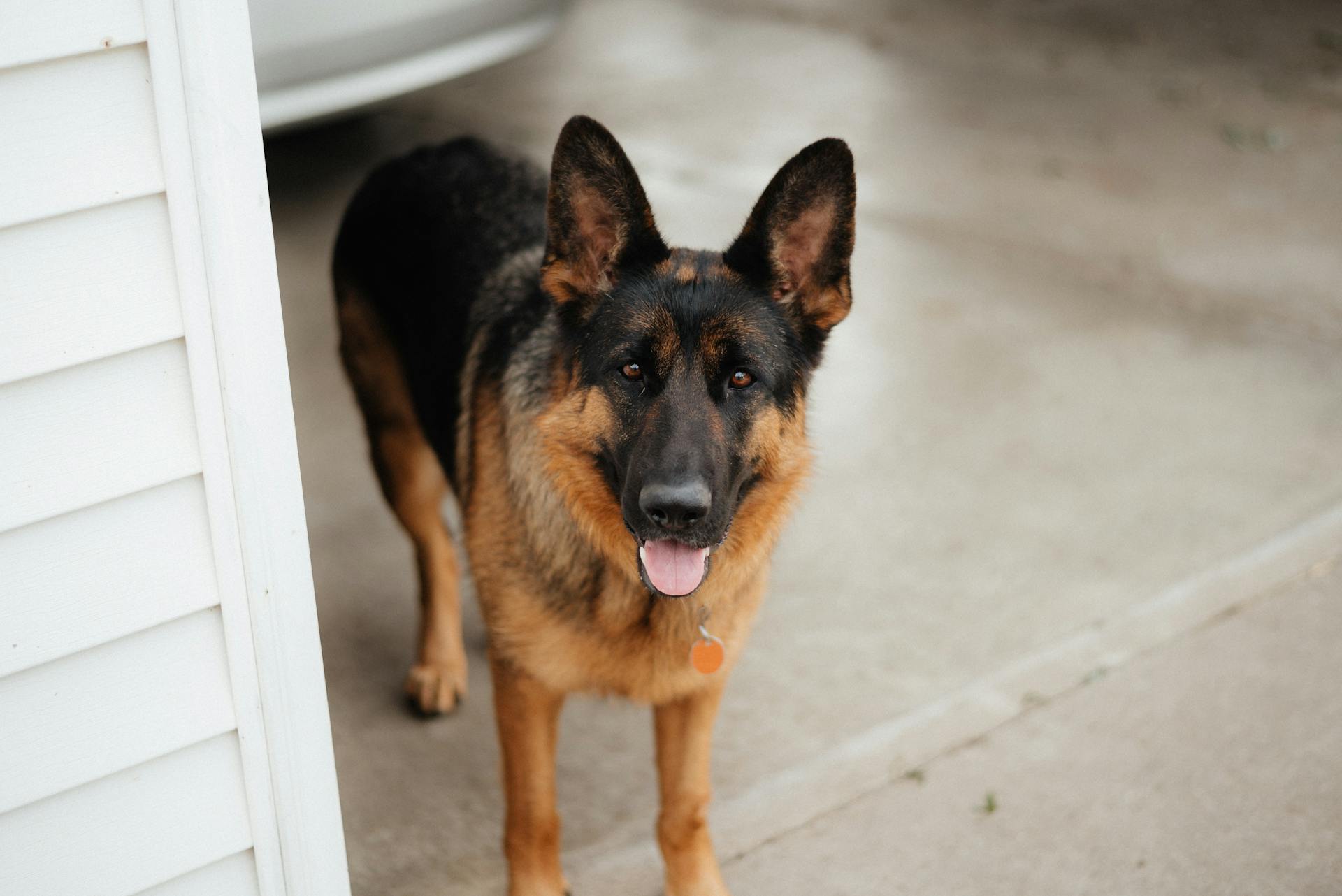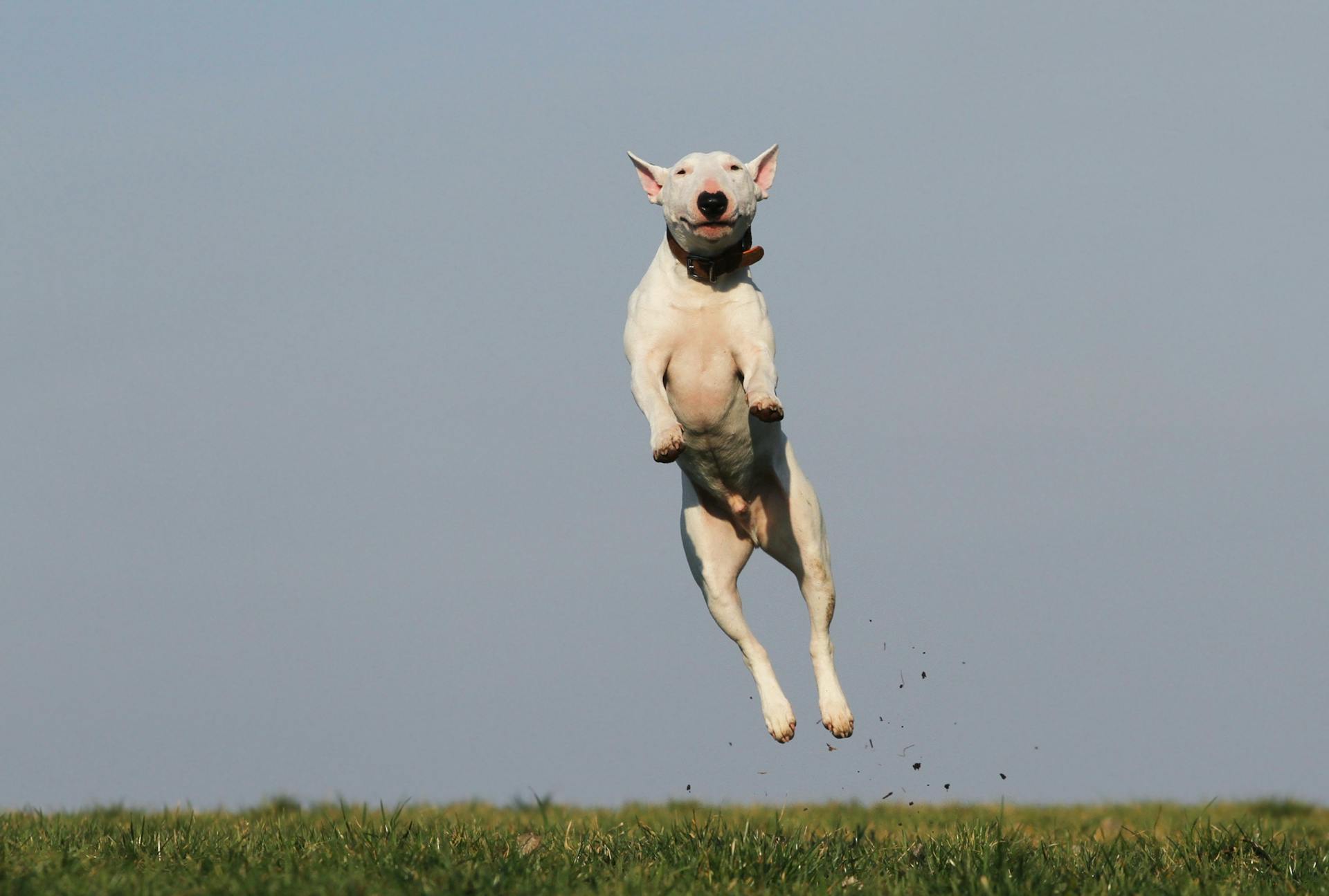
The Cane Corso is an ancient breed with a rich history dating back to the Roman Empire, where they were used as war dogs.
Their original purpose was to guard and protect, making them a valuable asset to the Roman military.
They were bred to be intelligent and trainable, traits that served them well in their role as war dogs.
The Cane Corso's loyalty and protective nature made them a favorite among Roman soldiers.
Their athleticism and strength allowed them to keep up with the demands of battle.
They were often paired with Roman soldiers as they marched into combat, providing a sense of security and companionship.
In their role as war dogs, the Cane Corso was tasked with tasks such as guarding camps and supplies.
Their keen senses and agility made them well-suited for this role.
They were also used to track and pursue enemies, utilizing their strong prey drive.
Their intelligence and loyalty made them a trusted companion on the battlefield.
Expand your knowledge: Roman Mythology Dog Names
Physical Characteristics
The Cane Corso is a large dog breed, standing between 23 to 27 inches in height. Their broad chest and wide skull make them a sturdy-looking giant.
Their weight can vary depending on sex, with males averaging around 110 pounds and females around 99 pounds.
Cane Corsos have a distinctive appearance, with a wrinkly forehead and floppy ears. Some owners choose to have their ears cropped, but this is purely for cosmetic reasons and doesn't have any health benefits for the dog.
Their short, thick, double coat comes in a variety of colors, including black, black brindle, gray, gray brindle, fawn, red, and chestnut brindle.
Here are the Cane Corso coat colors in a list:
- Black
- Black Brindle
- Gray
- Gray Brindle
- Fawn
- Red
- Chestnut Brindle
Their almond-shaped eyes can vary in color, ranging from shades of brown to blue and yellow.
Care and Maintenance
Cane Corsos are low maintenance when it comes to grooming, requiring only a quick brushing once or twice a week and occasional bathing.
Their short, stiff coat sheds minimally, but you'll want to keep a brush and vacuum handy for seasonal shedding, which occurs twice a year.
Introduce your Cane Corso puppy to bathing and brushing early on, as well as to tooth brushing and nail trimming. This will make future grooming sessions a breeze.
Regular dental care is crucial, brush your Cane Corso's teeth at least three times a week, if not daily, to reduce the potential for dental disease later on.
As with many large dogs, drooling can be an issue, so keep a towel close to mop up messes.
Temperament and Behavior
The Cane Corso's temperament is a unique blend of sensitivity and independence. They can be naturally alert to new people and animals, making proper training and socialization essential.
Cane Corsos are highly intelligent and can be easily trained to ignore strangers and animals that pose no threat. This makes them excellent watchdogs and, with training, protection dogs.
Their serious and sensitive nature means they may assert themselves as dominant if not properly trained, so early socialization is crucial. They need to learn that not everyone is a threat.
A Cane Corso's size and strength can be intimidating, but they are also kind and affectionate companions to their family members. In fact, 88.1% of Cane Corsos passed the Temperament Test, indicating they are generally well-behaved.
However, their strong prey drive means they may chase other animals down, so it's essential to supervise interactions with other pets. Early introduction to children is also a must, as they can be gentle but may accidentally harm them due to their size and strength.
Despite their potential as guard dogs, Cane Corsos may not be the best choice for young families or the elderly due to their independent nature and high energy level.
Training and Socialization
Training and socialization are crucial for any dog, but especially for Cane Corsos. They're highly intelligent and respond best to positive reinforcement training.
Cane Corsos can be strong-willed and think they're in charge, so firm, patient, and consistent training is a must from an early age. They need to be introduced to as many people, kids, and pets as possible in a safe and positive manner.
Early socialization is vital to help nip undesirable behaviors in the bud. This means exposing your puppy to various environments, sights, and sounds to help them grow into well-mannered adults.
Cane Corsos are generally easy to train, but they need consistent, lifelong training to stay on track. They respond best to positive training and rewards, and high-value treats can be a great motivator.
Socialization must start at a young age and continue throughout their lives. Introduce your dog to as many people, noises, situations, and everyday items as possible in a calm and controlled manner.
Regular exercise and mental stimulation are key to a Cane Corso's well-being. They need at least three walks per day or other outdoor exercise totaling at least an hour, though this can vary depending on the dog.
Mental stimulation or "work" is just as important as physical exercise. Cane Corsos were bred to do jobs for their family, and they need clear boundaries and regular tasks to stay happy and healthy.
Diet and Nutrition
Cane Corsos require a complete and balanced diet that meets their unique nutritional needs. A large-breed formula is essential, especially for puppies who need normal growth of bones and joints.
Feeding a large-breed formula is crucial because giant breeds have different requirements for calcium and phosphorus. Look for a statement on the package that says it meets nutritional standards established by the Association of American Feed Control Officials (AAFCO).
You can consider a high-quality, meat-based, large-breed dog food, such as Blue Buffalo Life Protection large-breed formula for adults or puppies. This can meet your Corso's nutritional needs while supporting healthy bones and joints.
A regular feeding routine is also important to maintain a healthy weight. Meal-feeding, where a measured amount of food is given at regular intervals, most often twice a day, can help reduce the risk of stomach torsion or bloat.
If you notice weight gain or have questions about the type and amount of food and feeding schedule, contact your veterinarian.
Explore further: Large Münsterländer
Exercise and Environment
Cane Corso owners need to provide their dogs with regular exercise, ideally a couple of miles a day, split into two or three shorter walks.
This can help prevent their high energy from being spent in less desirable ways, like destructive behavior. Exercise should include playtime and training for enrichment.
A romp in the snow is a great way to burn their energy, especially on cold days. However, it's essential to have enough space for exercising and training, which is why a backyard with a tall, sturdy fence is a must.
This breed is not suited for a romp with smaller dogs at the dog park, and keeping them on a leash can be challenging for inexperienced handlers.
For this reason, it's recommended to raise them with cats or other small pets from a young age to ensure they can live happily with housemates. However, their size and strength can cause unintended injury to children and smaller animals.
Teaching all children in your home how to gently and respectfully interact with dogs is crucial, along with socializing your Cane Corso. They may do best in adult-only households where they are the only dog or in households with older children who can participate in training and socialization.
Cane Corsos are intelligent, obedient, and eager to please, making them generally easy to train. Early socialization and training are a must for this breed, as it will help them grow into well-mannered and well-adjusted adults.
Mile-long runs twice a day can be enough to keep them fit and healthy, but they also need physical and intellectual stimulation to avoid destructive behavior.
Health
The Cane Corso is a majestic breed with a rich history, but like all dogs, they're not immune to health issues. Their life expectancy is 9 to 12 years, but some health problems can limit their lifespan and mobility.
Obesity is a significant concern for Cane Corsos, as it can lead to joint pain and mobility issues. A proper diet with joint supplements and regular exercise can help prevent this.
Hip dysplasia is a skeletal condition common to large-breed dogs, causing lameness, pain, and arthritis. It's essential to feed large-breed puppy food and provide proper joint care to prevent this condition.
Bloat is a potentially deadly condition that can occur in Cane Corsos due to their large, deep chests. Feeding smaller meals throughout the day and using a slow feeder bowl can help prevent bloat.
Idiopathic epilepsy is a seizure disorder that typically starts between 6 months and 5 years of age, with no known cause. There is a genetic screening test available for this condition.
Eye problems, such as entropion, ectropion, and cherry eye, are common in Cane Corsos, affecting the eyelid. If you notice any discharge, squinting, cloudiness, bulging, redness, or other symptoms, see your vet right away.
Here are some common health problems in Cane Corsos:
- Hip dysplasia: an inherited condition causing pain, lameness, and arthritis.
- Gastric dilatation-volvulus (bloat): a potentially life-threatening condition where the stomach fills with air and flips, cutting off blood flow.
- Eyelid abnormalities: like ectropion, causing the lower eyelids to roll out or droop.
- Idiopathic epilepsy: an inherited disorder causing seizures, with no known cause.
Breed History and Information
The Cane Corso is an ancient breed with a rich history that spans thousands of years. It's believed to have originated from the Molossi tribe in ancient Greece, who bred big, Mastiff-type dogs to be guardians.
Recommended read: What Are the 14 Ancient Dog Breeds
These early Molossers were brought to Italy by the Romans, who bred them with native breeds to produce the ancestors of today's Cane Corso and Neapolitan Mastiff breeds. The Romans used them as "pireferi", or military service dogs, and even carried flaming buckets of oil on their backs as they charged into battle.
The Cane Corso's name is derived from the Italian word "cane", meaning dog, and the Latin word "cohors", meaning guardian or protector. This name reflects the breed's original purpose as a guardian of people and property.
After the Roman Empire dissolved, the Cane Corso's role shifted from war dog to farmhand, hunting wild boar and guarding livestock. However, the breed's numbers declined significantly after World War II, and it was on the brink of extinction.
Fortunately, some Cane Corsi survived, and in the 1970s, a group of Italian dog fanciers set out to revive the breed. They successfully bred the Cane Corso back to health, and by the 1990s, the breed was making waves at dog shows across Europe.
A fresh viewpoint: Roman War Dog
Dog Ownership and Tips
If you're considering bringing a Cane Corso into your life, it's essential to know that they don't like being left alone for too long. They thrive on activity and love to have a job to do, so they need an active owner who can spend quality time with them.
Cane Corsos are also quite expensive to feed, so you'll need to factor that into your budget. They're low maintenance when it comes to grooming, but they do require regular exercise and mental stimulation to prevent destructive behavior.
Here are some states where Cane Corsos may face breed-specific bans in housing:
- Colorado
- Arkansas
- Kansas
- Idaho
- Oregon
- Nebraska
- Washington
- South Dakota
Dog Ownership
Cane Corsos are not for beginners, as they require hands-on, consistent training. They're not "set and forget" dogs you can take to a puppy manners class and then let live their lives.
Their large size requires room to spread out, and their energy and intensity need plenty of fenced-in space for exercise. They love their families and are not bouncing off the walls with energy, but they're work dogs, so they need to work.
The Cane Corso is a powerful dog that may be difficult to walk on a leash, and a harness should never be used, as that makes it easier for the animal to pull. They're also susceptible to canine hip dysplasia, so Cane Corso puppies should be raised on large-breed puppy food.
You'll need to clear up drool, and they're quite expensive to feed. They prefer spending time with their owners and don't like being left alone for too long. The ideal owner for a Cane Corso would be an active person who is at home most of the day.
If you live in one of the following states, be sure to check local animal control regulations before you consider buying or adopting a Cane Corso:
- Colorado
- Arkansas
- Kansas
- Idaho
- Oregon
- Nebraska
- Washington
- South Dakota
They need plenty of mental and physical stimulation, or they can become destructive. A quick brushing once or twice a week and occasional bathing are all that's needed for coat care.
Key Takeaways
As a dog owner, it's essential to consider the needs and characteristics of your furry friend. Here are some key takeaways to keep in mind:
Protective and loyal dogs like the Cane Corso can make great pets, but they require a large home with a securely fenced yard. They're good watchdogs, but may not be suitable for households with small children or multiple pets.
Dogs like the Cane Corso can be dominant by nature, so they need an experienced hand during training. This means investing time and effort into their training and socialization.
Some breeds, like the Cane Corso, are prone to health conditions such as hip dysplasia and bloat. Regular veterinary check-ups and pet insurance can help ensure your dog lives a long and healthy life.
Here are some common health issues that can affect dogs:
- Hip dysplasia
- Bloat
- Certain congenital eyelid disorders
Remember, every dog is unique, and their needs may vary. With the right care and attention, your furry friend can thrive and bring joy to your life.
General Information
The Cane Corso is a breed of mastiff dog descended from ancient Rome's Molossian war dogs. It's a versatile farm dog and guardian, originally bred in Italy.
The Cane Corso typically weighs 90 to 110 pounds and stands 23 to 28 inches tall at the withers. This makes it a medium to large dog with a muscular, stocky physique.
Its short stiff coat comes in four colors: black, gray, fawn, or red, and may be brindled. The thick tail is traditionally docked, and the ears are cropped short in countries where it's legal.
The Cane Corso is a working dog through and through, with a strong instinct to protect its family. It's a loyal breed that's intelligent and affectionate.
Corsos can weigh between 80 and 120 pounds, with an imposing stature that's balanced by their affectionate nature. Adult corsos have a large, square head and deep chest.
The Cane Corso's protective nature may have inspired its name, which comes from Latin and can be translated as "bodyguard dog" or "guard dog of the courtyard."
Check this out: American Pit Bull Terrier Temperament Affectionate
Frequently Asked Questions
What breed were Roman war dogs?
The Roman war dogs were primarily Molossian breed, specifically bred for combat. This powerful breed played a significant role in ancient Roman warfare.
What two breeds make a Cane Corso?
The Cane Corso is believed to have originated from the Greek Molossus dogs and later crossed with fighting dogs from England, specifically the "pugnaces" breed. This ancient lineage has contributed to the Cane Corso's distinctive characteristics and versatility.
Featured Images: pexels.com


